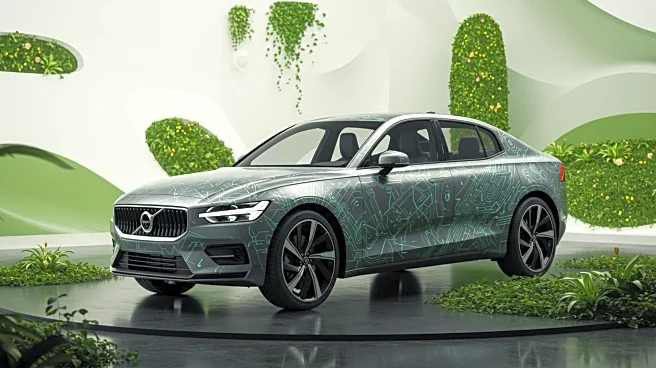What is the story about?
What's Happening?
Volvo Cars has unveiled its new fully-electric ES90 model, marking a significant advancement in sustainable vehicle manufacturing. The ES90 is produced using climate-neutral energy and incorporates recycled materials, such as recycled aluminum for wheels and battery trays, recycled copper in motor wiring, and bio-based materials like PA11 in battery cooling pipes. The vehicle's carbon footprint is notably reduced, with a total of 31 tonnes when using a European energy mix and 26 tonnes with wind energy. This represents a 50% reduction compared to the Volvo S90 mild hybrid and a 30% reduction compared to the plug-in hybrid S90. Production is set to begin in late summer 2025, with deliveries expected in spring 2026.
Why It's Important?
The introduction of the ES90 underscores Volvo's commitment to sustainability and environmental responsibility in the automotive industry. By significantly reducing the carbon footprint of its vehicles, Volvo is setting new standards for eco-friendly car production. This move is likely to influence other manufacturers to adopt similar practices, potentially leading to broader industry shifts towards sustainable manufacturing. The use of recycled and bio-based materials also highlights the growing importance of circular economy principles in reducing environmental impact.
What's Next?
Volvo's production of the ES90 is scheduled to commence in late summer 2025, with customer deliveries anticipated in spring 2026. As the automotive industry continues to evolve, Volvo's approach may prompt other manufacturers to accelerate their own sustainability initiatives. Stakeholders, including environmental groups and industry competitors, will likely monitor the ES90's market performance and its impact on consumer preferences for sustainable vehicles.
Beyond the Headlines
Volvo's focus on sustainability with the ES90 could have long-term implications for the automotive industry, including potential regulatory changes and increased consumer demand for eco-friendly vehicles. The company's use of climate-neutral energy and recycled materials may also influence supply chain practices, encouraging suppliers to adopt more sustainable methods.















